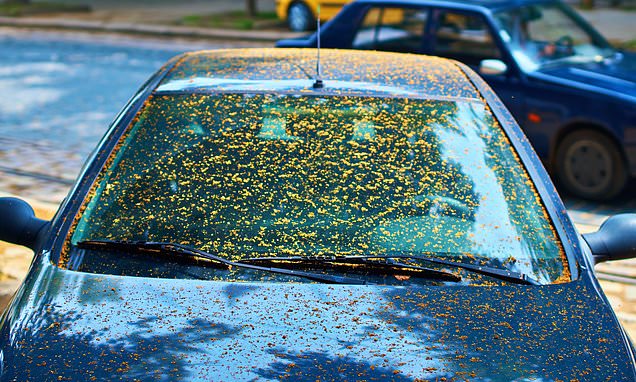
Drivers warned NOT to park under trees this summer to avoid £800 bill
06/02/2023Drivers warned NOT to park under a tree this summer because it could land you with an £800 bill
- Car expert Graham Conway warned of the upcoming aphid population boom
- Read More: Driving instructor reveals the common road sign people ‘never know’ the meaning of (and it’s SO easy to get caught out!)
Drivers have been warned they could be landed with an £800 bill if they park under trees this summer.
In the coming months, the aphid population is set to sky-rocket in the UK as the temperatures rise.
These tiny insects survive on the sap from flowers and trees. However, it’s their droppings which can prove particularly problematic for car owners.
Speaking to The Sun, Select Car Leasing’s Managing Director Graham Conway explained how the sticky yellow excrement slowly erodes the vehicle’s paintwork.
The expert said: ‘They excrete a sticky substance known as “honeydew” that, when it falls on bonnets, boots and roofs, forms a residue.
Aphid droppings which can prove particularly problematic for car owners as it forms a sticky yellow residue. Expert Graham Conway said it can cause £800 worth of damage to the paintwork
‘If left on the surface, it turns into soot-like black mould spores that are highly acidic and can therefore eat through paintwork.’
The expert claims that the damage caused by the insect droppings can cost up to £800 to fix.
However, Graham says drivers can save themselves some money in the long-run by keeping some wet wipes in their car.
He urged car owners to wipe away the honeydew the moment they see it and then recommended using some specialist cleaning detergents once they return home.
What’s more, he also recommended owners take the same approach to bird poo – as this can also cause expensive damage to paintwork.
As up to 2.5m aphids can inhabit a single tree, the expert said it’s better to avoid parking under any at all to reduce your risk of a pricey trip to the garage.
There are over 5,000 breeds of aphids and according to the Royal Horticultural Society, plum aphids are particularly drawn to fruit trees.
The insects have also been reported to inhabit willow, pine, elm, walnut, beech and maple trees.
There are over 5,000 different types of aphids. Pictured: one breed pictured consuming the sap on a green leaf
Gardener’s World’s Monty Don (pictured in 2022) previously explained how to treat an aphid infestation at home. Instead of using harsh chemicals, he recommended spraying leaves with a weak soapy mixture
Writing for the Daily Mail in 2014, Gardener’s World’s Monty Don explained how an aphid invasion can cause ‘leaves and stems to curl, yellow, pucker, blister, shrivel and even die’.
He explained: ‘Aphids are usually blown into the garden, although as summer progresses more and more flying aphids hatch that will move themselves around at will.’
Warning of the dangers of their excrement, Monty added: ‘As they feed, aphids excrete a sugary substance called honeydew which is ideal for fungal moulds to grow on.’
However, the expert said that treating the problem in your garden will only ‘enforce the boom’ of insects.
He added: ‘A temporary infestation can be dealt with by rubbing them off with your hand, hosing them down with water or, if neither of these methods seems sufficient, spraying a weak soapy mixture that acts as a contact insecticide damaging the hard shells of the nymphs.
‘Although it wears off very fast, I would only use a soap spray under very extreme circumstances, as it will also kill ladybirds and any other insects.’
Source: Read Full Article




